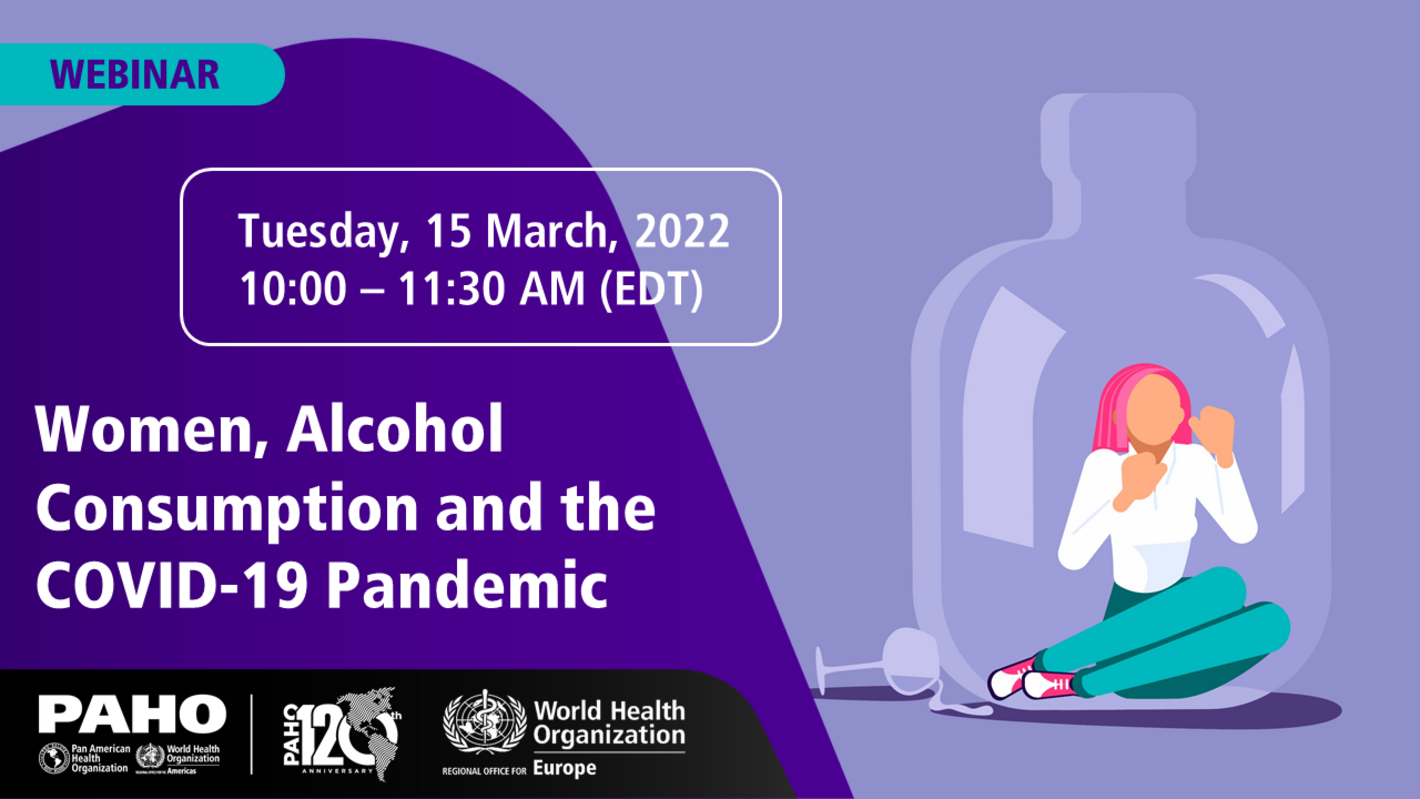
Join us on Tuesday, 15 March, on the webinar "Women, Alcohol Consumption and the COVID-19 Pandemic" to discuss the impact of COVID-19 pandemic on women´s mental health, alcohol consumption, and how alcohol marketing, policies and interventions have influenced women's health during the COVID-19 pandemic. The session will also discuss the implications for equity and the building of health systems that are responsive to gender differences and the needs of women across their life span.
How to participate
- DATE: Tuesday, 15 March 2022
- TIME: 10:00 – 11:30 AM EDT [check below local times]
- REGISTER: https://who.zoom.us/meeting/register/tJ0rf-qsqzkiHNaxUcNXLCuKxNJU1vlJdYfp
- LANGUAGES: English with interpretation in Spanish and Russian
Recording
Background
Many studies have raised concerns about alcohol consumption among women during the coronavirus pandemic. Stressful events correlate with higher levels of alcohol consumption at the population level. Data from the early stages of the pandemic in the Americas suggested that anxiety and depression symptoms were more prevalent in women and those reporting heavy episodic drinking before the pandemic tended to increase their use during the period. Also, the effects of “drinking to forget one’s worries” seemed more prominent among women. In the eastern part of Europe, women were less likely to decrease their alcohol use during the pandemic compared to men.
The COVID-19 pandemic also led people to spend more time online. Online alcohol marketing skyrocketed, as well as sales online, in many countries. Alcohol companies have seen an unprecedent opportunity to market their brands and products, raising their capacity to historically shape how gender roles and expectations are understood, as well as increasing the likelihood of drinking among women and girls, which constitute a large potential group for alcohol sales. Alcohol is also portrayed as coping mechanism for pandemic-related stress of motherhood, contributing to misinformation on alcohol use among women and the health problems associated with it, including during pregnancy or while breastfeeding. Multiple dimensions shape women’s experiences with alcohol use and must shape the health responses to support them, especially in difficult times.
Agenda
-
Welcome and moderation.
-
Kristina Sperkova. President, Movendi International
-
-
Opening remarks
-
Carina Ferreira-Borges. Acting Director, WHO European Office for the Prevention and Control of Noncommunicable Diseases
-
-
Impact of COVID-19 pandemic on women’s mental health
-
Dévora Kestel. Director, Department of Mental Health, World Health Organization
-
-
Alcohol use among women during the COVID-19 pandemic: what do we know?
-
Zila Sanchez. Associate Professor, Department of Preventive Medicine, Federal University of Sao Paulo
-
-
Lockdown and alcohol marketing targeted to women and girls
-
Amanda Atkinson. Senior Researcher, Public Health Institute, Liverpool John Moores University
-
-
Motherhood, COVID-19 and alcohol use
-
Svetlana Popova. Senior Scientist, Institute for Mental Health Policy Research, Campbell Family Mental Health Research Institute, CAMH
-
-
Women’s health and alcohol use: a case in Australia
-
Caterina Giorgi. CEO, Foundation for Alcohol Research and Education (FARE)
-
-
Questions & Answers
-
Closing remarks & thank you
-
Maristela Monteiro. Senior Advisor on Alcohol and Substance Use, Pan American Health Organization
-
Time correspondence
- 7:00 am.– Los Ángeles, Vancouver
- 8:00 am. – Belmopan, Guatemala City, México City, Managua, San José (CR), San Salvador, Tegucigalpa
- 9:00 am. – Bogota, Kingston, Lima, Panama City, Quito
- 10:00 am. – Bridgetown, Caracas, Castries, Georgetown, Havana, La Paz, Nassau, Ottawa, Port-au-Prince, Port of Spain, San Juan, Santo Domingo, Washington DC
- 11:00 am – Asunción, Buenos Aires, Brasilia, Montevideo, Paramaribo, Santiago
- 3:00 pm. – Copenhagen, Geneva, Madrid
For other cities, check the time in the following link
Please note that the United States changes the summer time on March 13, but other countries do not change it, as the time difference may vary with respect to the usual difference.
Related links
Pahola, PAHO's first digital health specialist on alcohol use
Designed to help you understand the effects of alcohol and make recommendations on how to cut down on your alcohol use, Pahola can answer questions about alcohol consumption like, "how do I know if I drink too much?, "can you drink alcohol after the COVID vaccine?" or "does alcohol cause cancer?"

